The United States Food and Drug Administration (FDA) has initiated a proposal to remove oral phenylephrine from the market, labeling it a common ingredient found in many popular over-the-counter (OTC) decongestants. This decision has sparked considerable attention due to mounting evidence suggesting that phenylephrine is ineffective in treating nasal congestion. As a result, this has launched a six-month public comment period, allowing stakeholders and the general public to voice their opinions before the agency makes its final ruling on the matter.
Phenylephrine has been a staple in OTC medications for decades, included in well-known products such as Sudafed PE, Vicks DayQuil, and Mucinex Sinus-Max. Historically, it gained traction among consumers after regulations in 2005 moved pseudoephedrine—a similar decongestant that can be misused in methamphetamine manufacturing—behind pharmacy counters to control access, thus making phenylephrine the most readily available oral decongestant on the market. Notably, CVS has already taken preemptive measures by halting the sale of phenylephrine products following recommendations from an FDA advisory committee that deemed it ineffective.
Despite receiving FDA approval for OTC use back in the 1970s, the efficacy of phenylephrine has been a topic of contentious debate over the years. In 2007, an FDA advisory panel indicated that while phenylephrine “may be effective,” they called for additional research to evaluate its performance as a decongestant. This call for further investigation has now gained urgency, as numerous large-scale clinical trials conducted in recent years have reached similar conclusions regarding the ineffectiveness of phenylephrine when taken orally. In September 2023, another FDA advisory committee met and concluded that existing evidence clearly showed oral phenylephrine does not provide the intended therapeutic benefits at standard dosages.
If the FDA chooses to pull oral phenylephrine from the market, manufacturers will be afforded time to either reformulate their products or remove those containing the drug completely. Dr. Theresa Michele, the director of the FDA’s Office of Nonprescription Drugs, clarified that the current proposal is limited to oral forms of phenylephrine, noting that its use in nasal spray applications remains unaffected.
This development has prompted responses from industry representatives, notably the Consumer Healthcare Products Association (CHPA), which expressed disappointment regarding the FDA’s initiative. The CHPA maintains that the existing evidence does not warrant a change to the generally recognized as safe and effective (GRASE) status of oral phenylephrine. They emphasize the need for consumer access to such medications, arguing that maintaining consumer choice in healthcare is essential. Their statement highlighted the importance of having options for self-care, reflecting a core component of the American healthcare system.
Moreover, the CHPA’s argument is underscored by the fact that phenylephrine remains the only oral decongestant available without specific purchase restrictions, as opposed to its counterparts that require vigilant regulation. They further urged that access to effective treatments is essential for fostering self-care options among individuals grappling with common ailments such as the common cold or seasonal allergies.
In conclusion, the potential removal of oral phenylephrine from OTC products marks a significant shift in the pharmaceutical landscape for decongestant medications. As the public comment period unfolds, healthcare professionals, consumers, and manufacturers alike will be monitoring the FDA’s decision closely to weigh the consequences of this proposed change in policy. The conversation surrounding the effectiveness and safety of decongestants continues, placing emphasis on the critical role that regulatory agencies play in ensuring consumer health and safety.












